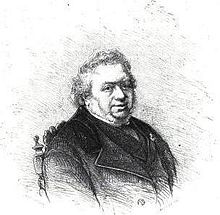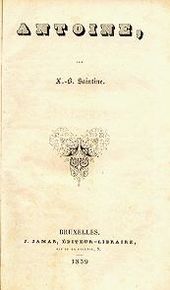Xavier-Boniface Saintine
Xavier-Boniface Saintine (born July 17, 1798 in Paris ; † January 21, 1865 there ; pseudonym for: Joseph-Xavier Boniface ) was a French comedian, vaudeville and novelist.
Life
Saintine was an unusually productive playwright who was involved in around 200 plays as sole or co-author, mostly under the pseudonym Xavier with Eugène Scribe or other authors from his writing workshop. He wrote numerous vaudevilles under the pseudonym Picciola . Together with Jacques-François Ancelot , he wrote the comedy Têtes rondes et cavaliers (1833), which served as the literary model for Vincenzo Bellini's opera I puritani . The Vaudeville -Stück Le Bouffon du Prince (The Fool Prince) of 1831, which Boniface together with Anne-Honoré-Joseph Duveyrier had written, formed the basis of Victor Hugo's drama Le roi s'amuse (1832), which in turn template Giuseppe Verdi's opera Rigoletto (1851) was.
However, Saintine gained particular fame during his lifetime as a novelist, especially for La Picciola (1836), a novel about a political prisoner who finds spiritual support in prison in a small flower that grows in the prison yard between the cobblestones.
Works
- La bonheur que procure l'étude. Didactic poem. 1817.
- Poëmes. 1823.
- Jonathan le visionnaire. Novel. 1827.
- Le mutilé. Novel. 1832.
- Une maitresse de Louis XIII. Novel. 1834.
- La Picciola. Novel. 1836 ( full text in Google book search).
- Seul. Novel. 1857.
literature
- Saintine, Joseph Xavier . In: Encyclopædia Britannica . 11th edition. tape 24 : Sainte-Claire Deville - Shuttle . London 1911, p. 19 (English, full text [ Wikisource ]).
Web links
- Literature by and about Xavier-Boniface Saintine in the catalog of the German National Library
- Works by and about Xavier-Boniface Saintine in the German Digital Library
- Works by Joseph Xavier Saintine in Project Gutenberg ( currently not available to users from Germany )
- Works by and about Xavier-Boniface Saintine in the Internet Archive .
| personal data | |
|---|---|
| SURNAME | Saintine, Xavier-Boniface |
| ALTERNATIVE NAMES | Boniface, Joseph-Xavier (real name); Saintine, X-B .; Boniface-Saintine, Xavier; Saintine; Xavier; Picciola |
| BRIEF DESCRIPTION | French comedian, vaudeville and novelist |
| DATE OF BIRTH | July 17, 1798 |
| PLACE OF BIRTH | Paris |
| DATE OF DEATH | January 21, 1865 |
| Place of death | Paris |

